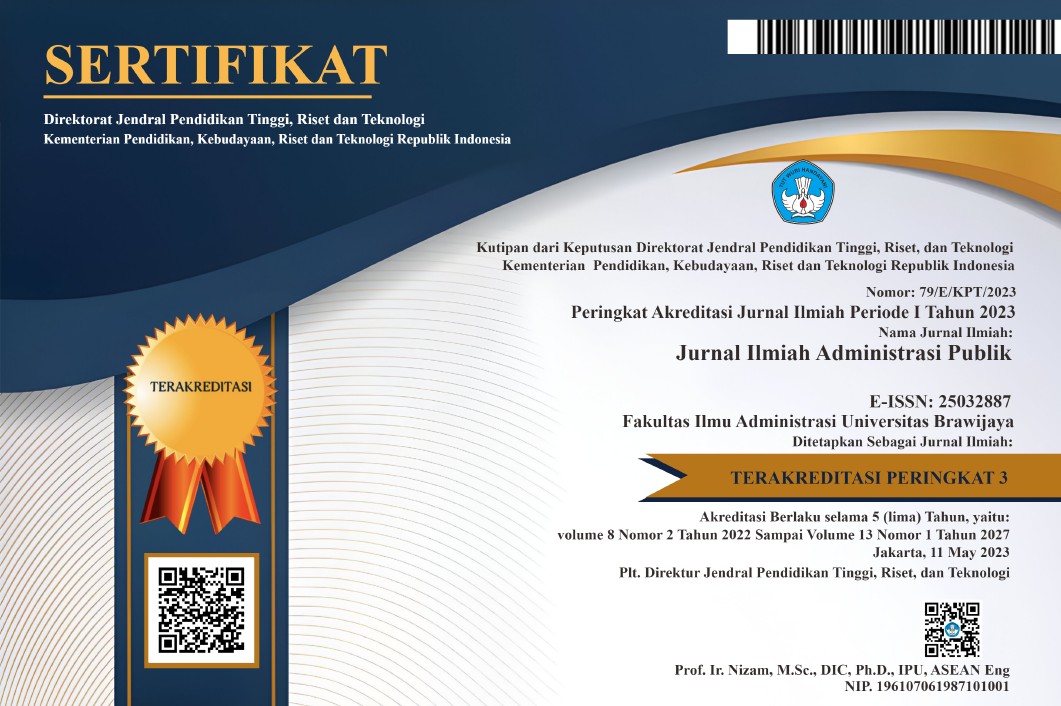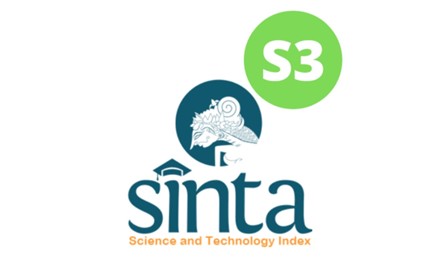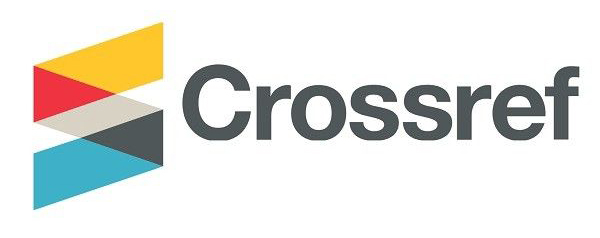Determinan Sikap Pemerintah Desa dalam Menggunakan Sistem E-village Budgeting
DOI:
https://doi.org/10.21776/ub.jiap.2017.003.02.3Keywords:
e-village budgeting, Determinan Sikap, Pemerintahan DesaAbstract
Penelitian ini bertujuan untuk menguji pengaruh persepsi kemudahan penggunaan, persepsi kegunaan, persepsi resiko, kecocokan dan kepercayaan terhadap sikap pengguna sistem e-Village Budgeting (EVB). Penggunaan sistem EVB yang diwajibkan, serta adanya kewajiban menggunakan sistem informasi dalam penyusunan anggaran desa, menjadikan penelitian mengenai sikap pengguna menarik untuk diteliti. Analisis data menggunakan Partial Least Square (PLS) dengan perangkat lunak warpPLS versi 3.0. Hasil penelitian menunjukkan bahwa pertama, sikap pengguna sistem EVB dipengaruhi oleh persepsi kegunaan pengguna mengenai sistem EVB yang digunakan dan kedua, sikap pengguna sistem EVB mengennai penggunaan sistem EVB dipengaruhi oleh tingkat kepercayaan pengguna terhadap sistem EVB yang digunakan. Selain itu, penelitian ini menemukan bahwa persepsi kemudahan, persepsi resiko dan kecocokan tidak memberikan pengaruh signifikan terhadap sikap pengguna sistem EVB.
References
Adesina, A. dan Ayo, C.K. 2010. An empirical investigation of the level of user’s acceptance of e-banking in Nigeria. Journal of Internet Banking and Commerce. Vol. 15 (1),1-13.
Agag, G., & El-Masry, A. 2016. Understanding Consumer Interntion to Participate in Online Travel Community and Effect Consumer Interntion to Purchase Travel Online and WOM : An Integration of Innovation Diffusion Theory and TAM with Trust. Elsevir. Computers in Human Behavior. 60,97-111.
Alsajjan, Bander. Charles Dennis. 2010. Internet banking acceptance model : Cross-market examination. Journal of Business Research. 63, 957-963.
Amaro, S., & Duarte, P. 2015. An integrative model of consumers' intentions to purchase travel online. Elsevir. Tourism Management. 46,64-79.
Ayeh, J.K., Norman Au., Rob Law. 2013. Predicting the intention to use consumer-generated media for travel planning. Tourism Management. 35, 132-143.
Baridwan, Z. 2012. Analisis keperilakuan individu terhadap implementasi sistem informasi akuntansi : model penerimaan dan kesuksesan sistem informasi berbasis teknologi. Disertasi. Program Doktor Ilmu Akuntansi Universitas Brawijaya.
Chau, P. Y. K. dan Paul, J. H. 2001. Information Technology Acceptance by Individual Professionals : A Model Comparison Approach. Decision Sciiences. Vol. 32 (4), 699-719
Cho, V. 2006. A study of the roles of trusts and risks in information - oriented online legal services using an integrated model. Information & Management Vol. 43; 502–520.
Davis, Fred D. 1989. Perceived Usefulness, Perceived Ease Of Use And User Acceptance Of Information Technology. MIS Quarterly. ABI/Inform Global. Management Science, 319.
Govindaraju, R., Indriany, N., Bruijin E. 2007. Studi Mengenai Penerimaan Sistem ERP : Enhancement Terhadap Model Penerimaan Sistem ERP Berbasis Technology Acceptance Model. National Industrial Engineering Conference. 4, 1-11.
Gupta, M P, Shivraj Kanungo, Rajesh Kumar and G P Sahu. 2007. A Study of Information Technology Effectiveness in Select Goverment Organizations in India. Vikalpa. 32 (2), 7–21.
Hartono, Jogiyanto. 2007. Sistem Informasi Keperilakuan. Andi. Yogyakarta
Hartono, Jogiyanto. 2008. Sistem Informasi Keperilakuan. Andi. Yogyakarta
Heijden, H. Van Der, Verhagen, T., Creemers, M. 2003. Understanding online purchase intentions : contributions from technology and trust perspectives. European Journal of Information Systems. 12, 41–48.
Hung, S.Y., Chang, C.M., Yu, T.J. 2006. Determinants of user acceptance of the e-Government services : The case of online tax filing and payment system. Government Information Quarterly. 23, 97–122.
Hsu, C.L., dan Hsi-Peng Lu. 2004. Why do people play on-line games? An extended TAM with social influences and flow experience. Information and Management. 41,853-868.
http://www.banyuwangikab.go.id/
Jan, Alberto Un., & Contreras, Vilma. 2011. Technology Acceptance Model for The Use of Information Technologu in Universities. Elsevir. Computers in Human Behavior. 27, 845-851.
Joey, F. George, 2004. The theory of planned behavior and Internet purchasing. Internet Research. Vol. 14 (3). 198 – 212.
Kapoor, K, Yogesh, D. Dan Niall, C.P. 2014. RFID integrated system in libraries : extending TAM model for empirically examining the use. Journal of Enterprise Information Management. 27(6), 731-758.
Kim, L. H., Qu, H., & Kim, D. J. (2009). A study of perceived risk and risk reduction of purchasing air-tickets online. Journal of Travel &Tourism Marketing. 26(3), 203-224.
Lam, Terry., Vincent Cho, dan Hailin Qu. 2007. A Study Of Hotel Employee Behavioral Intentios Woward Adption Of Information Technology. Elsevier. International Journal of Hospitality Management. 26,9-65.
Lee, C. dan Ming. 2009. Predicting and Explaining the Adoption of Online Trading : An Empirical Study in Taiwan. Decision Support Systems. 47, 133-142.
Lee, S.H., dan Ngoc, H.T.B. 2010. Investigating The onLine Shopping Intentions of Vietnamese Students : an Extension of The Theory of Planned Behaviour. World Transactions on Engineering and Technology Education. Vol.8 (4)
Lien, H.L. dan Cao. 2014. Examining Users Motivations, Trust, Attitudes and Positive Word of Mouth : Evidence From China. Computer in Human Behavior. 41, 104-111.
Mohammadi, Hossein. 2015. A Study of mobile banking usage in Iran. International Journal of Bank Marketing. 33 (6), 733-759.
Pavlou, P.A. 2002. What Drives Electronic Commerce? A Theory of Planned Behavior Perspective. Academy of Management Procedings. 1, 1-8.
Pratiwi, E. 2015. Determinan Minat dan Perilaku Nasabah dalam Penggunaan Mobile Banking : Satu Pendekatan Model Decomposed Theory of Planned Behavior. Tesis. Program Magister Akuntansi Universitas Brawijaya.
Taylor, S. Dan Todd, P. 1995. Understanding Information Technology Usage : A Test of Competing Models. Information Systems Research. Vol. 6 (2), 144-176.
Undang-undang Republik Indonesia Nomor 6 Tahun 2014 tentang Desa.
Wang, Q., Sun Xu. 2016. Investigating gameplay intention of the elderly using an extended technology acceptance model (ETAM). Technological Forecasting & Social Change. 107, 59-68.
Downloads
Published
Issue
Section
License
If your paper is accepted, the author identified as the formal corresponding author for the paper will receive an email prompting them to login into Author Services; where via the JIAP Author Licensing Service they will be able to complete the license agreement on behalf of all authors on the paper.














